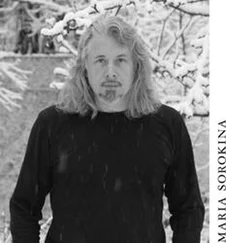323 310
324 311
325 312
326 313
327 314
328 315
329 316
330 317
331 318
332 319
333 320
334 321
335 322
336 323
337 324
338 325
339 326
340 327
341 328
342 329
343 330
344 331
345 332
346 333
347 334
348 335
349 336
350 337
351 338
352 339
353 340
354 341
355 342
356 343
357 344
358 345
359 346
360 347
361 348
362 349
363 350
364 351
365 352
366 353
367 354
368 383
369 384
370 385
371 386
372 387
373 388
374 389
375 390
376 391
377 392
378 393
379 394
380 395
381 396
382 397
383 398
384 399
The publication of this series was made possible with the support of the Zimin Foundation
Vladimir Bibikhin, The Woods
Boris Kolonitskii, Comrade Kerensky
Sergei Medvedev, The Return of the Russian Leviathan
Maxim Trudolyubov, The Tragedy of Property
Vladimir Bibikhin
Edited by Artemy Magun
Translated by Arch Tait
polity
First published in Russian as ΠΕС (hyle) by Hayκa (Nauka), 2011. Copyright Vladimir Bibikhin © 2020 This English edition © Polity Press, 2020
This book was published with the support of the Zimin Foundation.

The Translator asserts his moral right to be identified as the Translator of the Work
Polity Press
65 Bridge Street
Cambridge CB2 1UR, UK
Polity Press
101 Station Landing
Suite 300
Medford, MA 02155, USA
All rights reserved. Except for the quotation of short passages for the purpose of criticism and review, no part of this publication may be reproduced, stored in a retrieval system or transmitted, in any form or by any means, electronic, mechanical, photocopying, recording or otherwise, without the prior permission of the publisher.
ISBN-13: 978-1-5095-2590-4
A catalogue record for this book is available from the British Library.
The publisher has used its best endeavours to ensure that the URLs for external websites referred to in this book are correct and active at the time of going to press. However, the publisher has no responsibility for the websites and can make no guarantee that a site will remain live or that the content is or will remain appropriate.
Every effort has been made to trace all copyright holders, but if any have been overlooked the publisher will be pleased to include any necessary credits in any subsequent reprint or edition.
For further information on Polity, visit our website: politybooks.com
This is the first book-length translation into English of the work of the Russian philosopher Vladimir Bibikhin (1938–2004). Bibikhin is recognized by many (myself included) as the most important Soviet/Russian thinker of the second half of the twentieth century. In the 1990s, his public lecture courses enjoyed immense popularity, the lecture hall was packed, and almost every course was later published as a solid philosophical treatise. Within some fifteen years, Bibikhin created an impressive oeuvre on the scale of a philosophical encyclopaedia. This work was ‘marked’ (to use his term) and remarkable for many reasons, including a virtuoso Russian style, freely flowing in unpredictable directions to express an original thought, to connect a foreign word to a Russian word, a metaphysical formula to the spirit of the times and to the lived experience of contemporary politics and everyday life. Bibikhin’s was a free, original philosophy of genius which, nevertheless, was based on great erudition, some bibliographical research, and, as is clear with hindsight, was moving towards becoming systematic.
Bibikhin did not have a conventional academic career, and always characterized himself as a bit of a radical or rebel. In high school, he wrote something subversive in an informal school ‘wall’ newsletter, got a negative personal reference from the school principal, and for that reason failed to be admitted to the department of philosophy of Moscow State University. Instead, he served his time in the Soviet Army (from which most university students were exempted), then joined the department of foreign languages and spent his early life learning, with great proficiency, an impressive number of them: German, English, French, ancient Greek, Latin, and even Sanskrit. These studies, during which he met and studied under Andrey Zaliznyak, subsequently a renowned Soviet linguist, enabled him to develop an original hermeneutic theory of language, which he summarized in his dissertation (1977) and in his book The Language of Philosophy (1992). In the late 1960s, when a period of political freedom in the Soviet Union came to an end, as did the enthusiasm for Marxist doctrine, Bibikhin increasingly turned to religion and the Russian religious tradition, supported in this by that great survivor from early twentieth-century Russian philosophy, Alexey Losev, at that time better known as an authority on classical Greek culture. He befriended such key Russian Orthodox intellectuals of the late Soviet period as Sergey Horuzhy and Sergey Averintsev, both open-minded and interested in the high culture of Western Europe. In the 1970s and 1980s, Bibikhin worked at translating numerous philosophical texts, from Aristotle and Nicholas of Cusa, to Heidegger, Arendt, and even Derrida. He developed his own virtuoso style of hermeneutic translation, seeking to make foreign thought, faithfully translated, as intelligible and organically Russian as possible.
Most of his translations of twentieth-century non-Marxist authors, as well as critical digests of their work, were published in a limited number of copies for ‘special use’, under restricted access. As Bibikhin himself explains, the communist authorities were considering whether to switch their ideology from Marxism to something more realistic and nationally orientated (as their heirs eventually did in the 2000s). They therefore engaged intellectuals to critically review European and American non-Marxist philosophy (which ironically helped convert these intellectuals to liberal or conservative ideas). 1 Only during Perestroika in the USSR (1985–91), during a reform of university teaching in the humanities, did Bibikhin, who at that time was best known as a Heidegger specialist, begin teaching at the philosophy department of Moscow State University. This soon ended, in 1993, because of a conflict with the more positivistically minded senior members of the department, and also Bibikhin’s scatter-gun manner of teaching and researching. From then on and for most of the 1990s, Bibikhin did not have a university post. He obtained a position at the research-orientated Institute of Philosophy, and would just come to Moscow State University, since access to the building was then open, and teach in a lecture hall which happened to be unoccupied. He usually attracted a full house of students from all over the city. It was at this time that Bibikhin produced most of his numerous books, because he fully wrote his lectures out in advance and then read them to his audience. He spoke in a detached manner, in a rather high-pitched voice, creating the impression of a medium through whom the lecture was transmitting itself. It gradually became evident that the linguist and philosophical autodidact, who at first appeared simply to be rephrasing Heidegger, was actually an original philosopher in the process of creating his own philosophical system. He lectured on the world, the Renaissance, property, time, Wittgenstein, truth, wood, energy, and many other subjects. Importantly, Bibikhin was not a religious zealot remote from everyday life. His lectures were well spiced with irony and mundane examples. He drove a car (a rare thing at that time in the USSR for an academic), built his own wooden house in the country, married late for a second time, and was the father of four young children. Sadly, he contracted a cancer which killed him at the relatively early age of sixty-six.
Читать дальше













